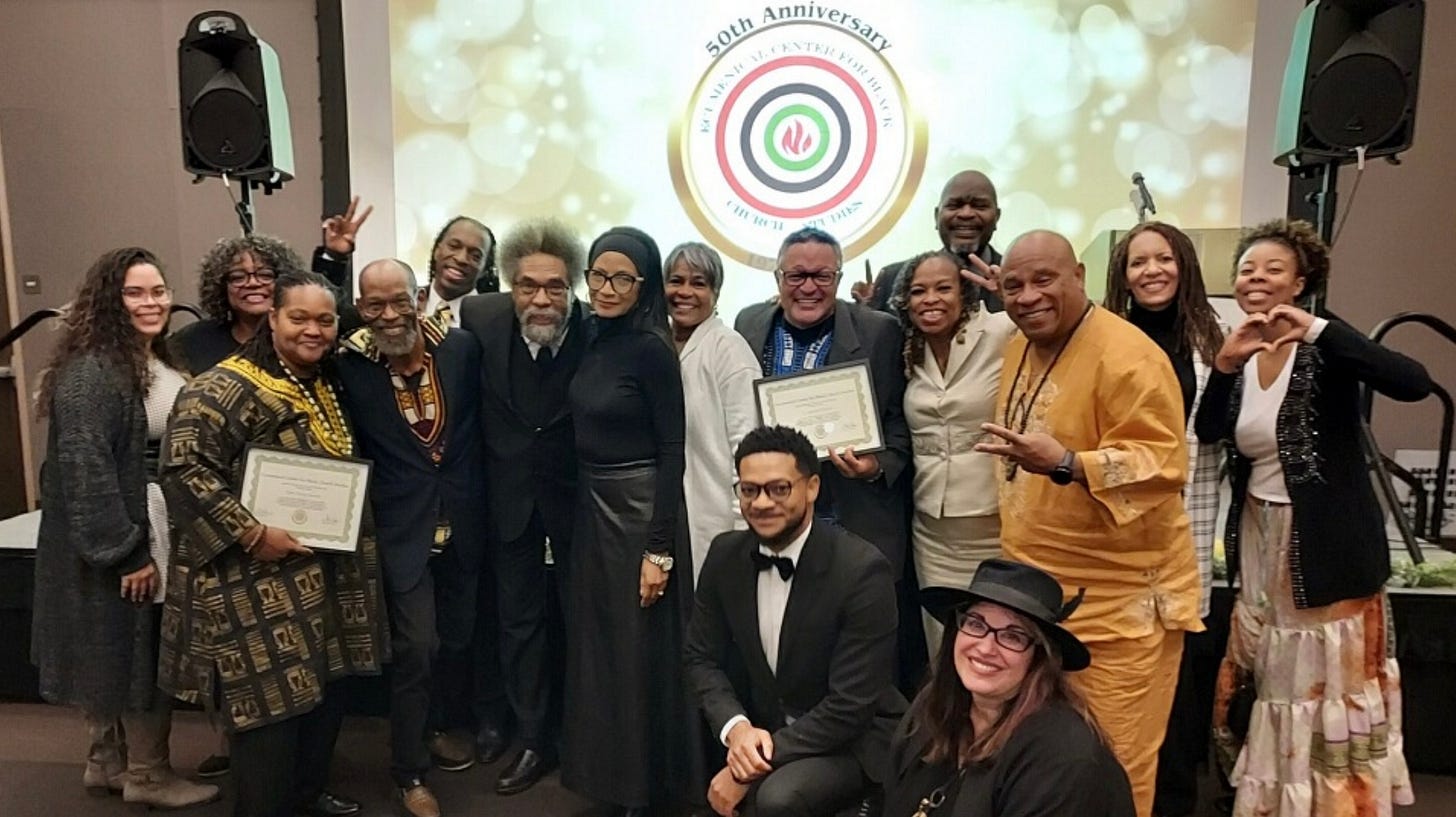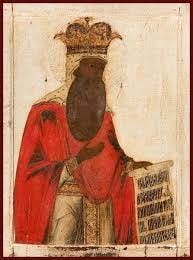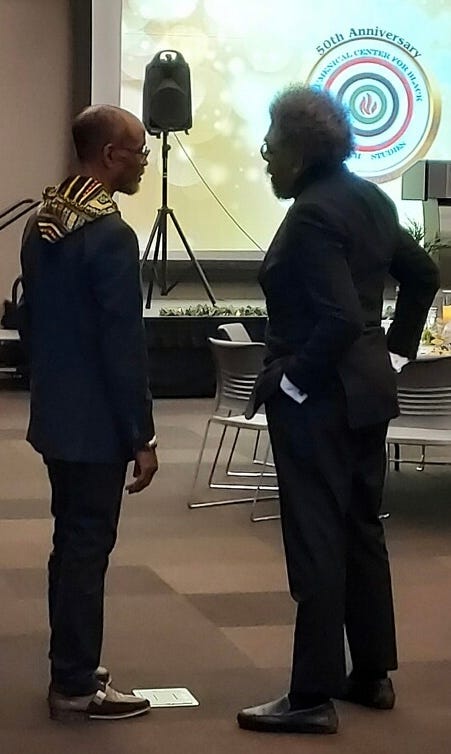
This Post is Part 2 of the Opening Address delivered at the 50th Anniversary of the Ecumenical Center for Black Church Studies (ECBCS) held in La Verne, CA. Part 1, was written by Dr. Kenneth B. Morris and was Posted earlier this week. The Addresses were given on Friday, October 18, 2024.
Let me begin by thanking my colleague, friend, and “former student” at ECBCS, Dr. Kenneth Morris. As we conceived of the idea of this joint presentation, it was natural for Dr. Morris to view the tradition from a lay perspective. My task is to discuss our legacy as an institution. I serve as a professor, Church pastor, and community activist in my work to Build the Beloved Community by drawing on the rich legacy of the Black Church Tradition. It is my pleasure to serve as the Executive Director of the Ecumenical Center for Black Church Studies. ECBCS is 50 years Old! ECBCS, 50 years … not many things last that long. But ECBCS, like everything associated with the Black Church in America, is in an interesting place. This is a time for careful and serious self-reflection and the question is “What Is the Legacy of ECBCS?” and “What does the future hold for ECBCS?” It is a similar question to the one scholars have been asking about the Black Church since the Civil Rights Movement: “Is The Black Church Dead?”
Some of you may remember when Eddie Glaude sparked an online debate in 2010. At that time he declared the Black Church was dead because it no longer served as the focal point for the social and moral expressions of the community. For Blacks brought from Africa, the church became a place for survival and hope. The story beginning with the Middle Passage is a powerful story of survival and the overcoming of tremendous odds - legal slavery, Jim Crow, the reversal of Civil Rights gained, and now Trump. The church has had its glory days. But what is up with the Black Church today?
There was a recent article that brings up an issue that has been discussed off and on now for at least 20 years, Is the Black Church dead? The article is titled: "Is the Black Church Dead? Religious Resilience and the Contemporary Functions of Black Christianity." by Shaonta' Allen. In the article, Allen writes:
Recent sociological literature draws attention to the changes in religious affiliation and expression among younger generations. … research suggests that the increase in religious "nones" (those who no longer identify with a religion) and "dones" (those who no longer affiliate with a religious congregation) substantiates the secularization thesis which contends that religion is becoming increasingly insignificant in modern society. However, when these trends are disaggregated across racial lines, religious affiliation remains high among Black Millennials.
In other words, while Millennials in general have moved away from Church and organized religion; African American Millennials still have a connection to their church. This is a good thing. This fact speaks to the deep cultural significance of the Black Church. We should keep in mind that the Black Church is far from being monolithic. The variety extends across the theological and socio-economic expanse of the nation. However, the connection to the local church is most often a deep familial or social connection rather than a theological or evangelical connection.
The Black Church tradition, as we understand it, begins here in America. We start with the middle passage, slavery and claim ignorance of Africa and African religion. Yet, the Bible itself provides a wealth of information about the original Biblical People and the African or Black presence in the Bible itself. Is there a theological message that comes as a result of reading the Bible from this perspective? Is there a Biblical Importance of the Black Church?
What I would like to do in the time I have is briefly outline a way of viewing the Bible Theologically; this not only returns our thinking to Mother Africa, but this move makes it a universal claim about Salvation History. Part of the challenge in modern culture is the ability to see the big picture. Our culture is built on instant gratification. If it takes too long, I’m not interested. What our fast-paced society has done is limit our ability for deep sustained thought or seeing the Big Picture: “I ain’t got time for that.” However, careful thinking is necessary to really find our place in life.
So, I would like to focus on one Person in the Hebrew Bible (Christian Old Testament) who also appears in the New Testament: Bib Picture. He is a somewhat supernatural person. The individual is Melchizedek. He is introduced to us in the Book of Genesis, chapter 14. There he encounters Abram and blesses him prior to Abram receiving the Jewish Covenant with God. So, we will need to really step back and see this figure in perspective. To understand Melchizedek properly we must understand his Blood Line. It is in understanding the ancestry of Melchizedek that all sorts of interesting things begin to show up in the text you thought you already knew. (At least that is the way it has been for me.) So, bear with me as we unpack Melchizedek’s ancestral line. We are doing this in order to emphasize the historical significance of the Black Church theologically, Then and Now.
BIG Picture: The first thing we must remember, because it is important, the Paradise we know as the Garden of Eden was in North Africa. How do we know? The four Rivers make the location clear. The rivers are: Pishon, Gihon, Euphrates, and the Tigris. Genesis tells us that the garden was planted “eastward in Eden," meaning that the whole region, of which this garden was only part, was seen as Paradise. The Author of Genesis describes the river Gihon as "encircling the entire land of Cush", a name associated with Ethiopia elsewhere in the Bible. (Genesis 2:13) So, North Africa is Paradise, Biblically speaking. Africa is the origin of all things including the human relationship with God --the Black Church!
Then to see the importance of Melchizedek, Africa, and the Black Church we go to what can be known as historical time. For those of us who follow the Bible historical time begins with Noah and his Sons. Remember the Big Picture is important. Our person of focus, Melchizedek has ties back to Noah and his sons. Melchizedek was a Jebusite. Jebusites were Canaanites (descendants of Canaan the son of Ham).
This story takes us back to the so called Curse of Ham. Anyone who reads the story carefully will see that it was not Ham, who had committed the indiscretion in the text. Ham saw his Daddy, Noah naked and did not know what to do. And because of it, Canaan was punished. Canaan was to be a servant to the brothers of Ham: Shem and Japheth. It is a strange arrangement. However, what we notice is that Canaan, Melchizedek’s forefather, was the first example we have of an INNOCENT SON PUNISHED FOR SINS OF his FATHER!!! As we understand the nature of Salvation history, this is important.
So, in the story of Noah and his Sons, each is sent to populate an area of the known World. Shem is sent to Asia. Japheth is sent to Europe. And for Ham and his Sons, it was back to the Garden – Northern Africa. Melchizedek’s family line was from that region of the world. We must remember that the area now called the Middle East was all a part of Northern Africa. You will recall in the New Testament Joseph had no problem taking Jesus and his wife Mary to Northern Africa, Egypt to avoid Herod’s desire to eliminate all threats to his reign by having all boys killed. So, at the time of his encounter with Abram, Melchizedek was an African High Priest that lived in what the Bible identifies as Salem. Salem, as many of you may know, will later be called Jerusalem. So, Let’s Start With Melchizedek.
The Importance of Melchizedek: When I was growing up and learning about the Bible, Abraham was the Man! At least in terms of getting it all started. Abraham was the man of Faith! And the role and importance of Abraham is not being questioned. But there was one before Abraham was. I’m speaking of Melchizedek.
So, for Modern History -- Let’s start with Melchizedek. If we start with Melchizedek, rather than Abraham, the Bible reads differently. What we see is what we already knew; but when we start with the African Melchizedek, it allows for connections that are restricted in the Abrahamic reading. So it is the following question we are to ponder: It takes us back to the sons of Noah and God’s covenant with all of creation — what is the relationship outside the Hebrew Covenantal Context?
Melchizedek has always been a theological mystery. Look at the way he is described in the New Testament book of Hebrews.
7 This Melchizedek was king of Salem and priest of God Most High. He met Abraham returning from the defeat of the kings and blessed him, 2 and Abraham gave him a tenth of everything. First, the name Melchizedek means “king of righteousness”; then also, “king of Salem” means “king of peace.” 3 Without father or mother, without genealogy, without beginning of days or end of life, resembling the Son of God, he remains a priest forever.
What this begins to show us when added up, is an individual of superior Character. So important is Melchizedek, we see that David and Jesus are the only ones mentioned in the Bible of His Order. In Psalm 110:4, to David,
The Lord has sworn
and will not change his mind:
“You are a priest forever,
in the order of Melchizedek.”
And in Hebrews 7:15 - 17, it says of Jesus, 15 And what we have said is even more clear if another priest like Melchizedek appears, 16 one who has become a priest not on the basis of a regulation as to his ancestry but on the basis of the power of an indestructible life.
17 For it is declared:
“You are a priest forever,
in the order of Melchizedek.”
What we begin to see when we look closely is that Character counts. In fact, in this day and age, it seems to be the determining factor. What is your character like? What is your neighbors character like? What is your nation’s character like? Melchizedek: “king of righteousness”; then also, “king of Salem” means “king of peace.” King David, chosen because he was a person who had God’s heart! And the nature of Jesus is without question, our Gold standard of righteous character.
But before we leave this Big Picture View of the Presence of the Black Church and its Origin, let me add one more King to the list. King Melchizedek, King David, King Jesus, and bringing it home, Martin Luther King, Jr. So, for us on this side of the Atlantic, there are these three (four if you count David) kings: Melchizedek, Jesus, and Dr. King – Jesus is the King of Kings and the Lord of Lord’s – But when all the Kings are saying the same thing … What you begin to see is the importance of the Message as being the thing we need to see. Remember it is the Big picture that we often miss.
It was not long ago that Dr. King used the principles of Melchizedek to move the Nation, Melchizedek King of Peace, non-violence was used. King said: “I have a dream that my four little children will one day live in a nation where they will not be judged by the color of their skin but by the content of their character.”
I am amazed that a person with no character could become President of the United States again. Character Counts. Is that the message of the Black Church today? What factors are shaping... determining... your character? Who and what are you working for?
So Don’t Get it Twisted. The Black Church did not get its start after the journey to America as a result of the Slave Trade and the Middle Passage. No, the Church has always been Black and other colors. But we should not forget its origin and the significance of that origin. Teaching the Bible from the true historical perspective allows for indigenous connections while affirming the Christ Story. It is important to recognize that there were true worshipers of God before Abraham. Recognizing the Legacy of the Black Church in its full context, may help bring some character to our lives as we move into the next 50 years.





